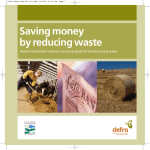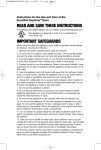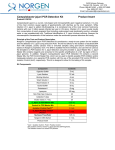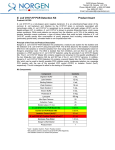Download Breville Customer Service Centre
Transcript
Breville Customer Service Centre Australian Customers New Zealand Customers Mail: Mail: PO Box 22 Botany NSW 2019 AUSTRALIA Private Bag 94411 Botany Manukau 2163 Auckland NEW ZEALAND Phone: 1300 139 798 Phone: 0800 273 845 Fax: Fax: (02) 9384 9601 Email: Customer Service: [email protected] 0800 288 513 Email: Customer Service: [email protected] www.breville.com.au Breville is a registered trademark of Breville Pty. Ltd. A.B.N. 98 000 092 928. Copyright Breville Pty. Ltd. 2012. Due to continued product improvement, the products illustrated/photographed in this brochure may vary slightly from the actual product. BSV600 Issue - A12 the SousVide™ Instruction Booklet BSV600 CONGRATULATIONS on the purchase of your new Breville SousVide™ Contents 4 Breville recommends safety first 6 Know your Breville SousVide™ 8 Operating your Breville SousVide™ 13 Care & cleaning 15 Troubleshooting 3 Breville recommends safety first At Breville we are very safety conscious. We design and manufacture consumer products with the safety of you, our valued customer, foremost in mind. In addition we ask that you exercise a degree of care when using any electrical appliance and adhere to the following precautions. Important safeguards Read all instructions BEFORE USE AND SAVE FOR FUTURE REFERENCE • Read all instructions carefully before using the machine. • Do not touch hot surfaces. Use handles or knobs. The lid and lid handles may get hot while cooking; use of an oven mitt when handling is advised. • To protect against electrical shock, do not immerse cord (power lead), plug, or sous vide cooking unit in water or other liquid. • Children should not use this appliance. When in use around children, close supervision by an adult is necessary and the appliance should be kept out of their reach. • Keep the appliance and cord (power lead) away from hot surfaces, heated ovens, or stove burners. Operate the appliance only on a dry, stable surface, such as a table or countertop and away from any moving parts. • Unplug from outlet when not in use and before cleaning. Allow machine to cool before putting in or taking out parts or emptying the water bath. Do not immerse this appliance in water or any other liquid. • Do not use this appliance outdoors. • Do not use any attachment or accessory not recommended by Eades Appliance Technology LLC. Use of such attachments or accessories may cause fire, electrical shock, or injury. • Do not use this appliance for any purpose other than its intended use. 4 • Do not use this appliance if it has been dropped or appears to be damaged. Do not use this appliance if it has a damaged cord or plug, or after it malfunctions in any manner. Return the appliance to the nearest authorized service facility for examination, repair, or adjustment. • Do not attempt to operate (heat) the unit without sufficient water in the bath to completely cover the bottom rack and to reach the FILL level mark on the sidewall. • Take care not to overfill the water bath; allow sufficient room to accommodate the volume of food pouches when added to water bath. Top off water in bath to no more than the MAX level mark after adding pouches, if necessary, to ensure the food inside the pouches is completely submerged. • Extreme caution must be used when moving an appliance containing hot water or other hot liquids, including the sous vide. Always allow bath to cool before emptying unit. • Take care when removing the lid when unit is hot, as hot water will collect on the inside during cooking. Use oven mitts to remove lid and tip lid carefully to drain accumulated water into the water bath for safety. • To disconnect, press the OFF button for three (3) seconds to turn off, then remove plug from wall outlet. • This appliance is not intended for use by people with reduced physical, sensory or mental capabilities or who lack experience with cooking appliances. Breville recommends safety first IMPORTANT SAFEGUARDS FOR ALL ELECTRICAL APPLIANCES • Fully unwind the power cord before use. • Do not let the power cord hang over the edge of a bench or table, touch hot surfaces or become knotted. • To protect against electric shock do not immerse the power cord, power plug or appliance in water or any other liquid. • The appliance is not intended for use by persons (including children) with reduced physical, sensory or mental capabilities, or lack of experience and knowledge, unless they have been given supervision or instruction concerning use of the appliance by a person responsible for their safety. • Children should be supervised to ensure that they do not play with the appliance. • It is recommended to regularly inspect the appliance. To avoid a hazard do not use the appliance if power cord, power plug or appliance becomes damaged in any way. Return the entire appliance to the nearest authorised Breville Service Centre for examination and/or repair. • Any maintenance other than cleaning should be performed at an authorised Breville Service Centre. • This appliance is for household use only. Do not use this appliance for anything other than its intended use. Do not use in moving vehicles or boats. Do not use outdoors. Misuse may cause injury. • The installation of a residual current device (safety switch) is recommended to provide additional safety protection when using electrical appliances. It is advisable that a safety switch with a rated residual operating current not exceeding 30mA be installed in the electrical circuit supplying the appliance. See your electrician for professional advice. SAVE THESE INSTRUCTIONS 5 5 KNOW your Breville SousVide™ KNOW your Breville Sous Vide K A. Stainless steel lid Contains steam during cooking process, and inverts to hold grill and rack when removing food parcels from water. B. Plastic handles Insulated from stainless steel lid. C. Pouch Rack Arranges food pouches vertically or stacked in the water bath for even cooking. D. Wire handle Under grill for easy removal of contents. E. Grill Separates food parcels from contact with surface. F. Stainless steel water bath 11.2-liter capacity of food and water when filled to MAX line. G. Side handles Positioned asymmetrically to aid in emptying the bath. H. Durable stainless steel body I. Control panel and PID controller J. Base with occluded ventilation K. Insulating lid blanket This component helps to minimize heat loss through the lid and can double as an insulating pad to protect counter top from the heat of the lid, once removed. 1. 2. 3. 4. 5. WATER temperature indicator light SET water temperature indicator light Countdown TIMER light Set temperature button Increase/decrease value toggle (+/-) arrows 6. Power ON/OFF button 7. Celsius/Fahrenheit switch button 8. HEATING element active indicator light 9. Timer active indicator light 10. Set timer button 11. Start button A B C D E F G H I J 1 2 7 8 3 9 4 10 5 5 6 11 7 OPERATING your Breville SousVide™ Operating your Breville Sous Vide Before first use 1. Be sure water bath contains water before starting the machine. 2. Properly insert the electrical cord (power lead) into the power socket on the back of the machine and plug it into the wall socket. 3. Press and hold the POWER ON/OFF button for 3 seconds to turn the machine on. You should feel a slight “click” and hear a tone. 4. The water temperature indicator light should illuminate and the display will read the current temperature of the water in the bath. (The machine will be preset to either Celsius or Fahrenheit readings. To change the setting, press the small Celsius/Fahrenheit switch button.) 5. To set the desired temperature, press the SET TEMP button. The SET temperature indicator light will illuminate. The default temperature of 140˚F/ 60˚C should appear. Using the INCREASE/ DECREASE VALUE toggle arrows, increase (+) the temperature or decrease (-) the temperature to set to your desired target temperature for cooking. When you have reached the target temperature on the display, press START button to begin heating the water to that temperature. An audible alert sounds as the bath begins to heat. The HEATING indicator light will illuminate red until the target temperature is reached, at which time it will turn green. (Audible alarm, a repeating beep at 1-second intervals, will also indicate that the target temperature has been reached.) 6. Setting the Countdown TIMER function is not necessary to operate the machine. The heating element will operate regardless of whether the timer function has been set. Except when cooking tender or delicate foods at target temperatures that exceed their normal serving temperature—during which timing the cooking of your food pouch could be critical to prevent overcooking—precise timing of sous vide cooking usually is not necessary. To use the timer: a) Wait to set the timer until the water bath in your sous vide has reached the desired target cooking temperature and you are ready to place the food pouches into the water bath. b) To use the timer function, press the SET TIMER button. Time value in minutes will appear in the display window. c) Increase/decrease timer setting using the +/- arrows. The time displayed will change in 1 minute increments to 30 minutes, then will speed up. d) When the desired length of cooking time has been reached, press START button to begin timing. After a few seconds the display will return to display the water bath temperature. To view remaining time at any point in the cooking process, press SET TIMER button. Insert the Temperature Control Probe into the probe socket on the appliance. Plug into a 230/240V power outlet and switch ON. Always insert the probe into the appliance first, then insert plug into power outlet. 9 Operating your Breville Sous Vide Cooking with the Sous Vide As with any new cooking method, there are some differences in technique that you will want to become familiar with. Here are the basic principles you should understand: • Length of cooking time depends on the thickness of the food more than the weight. Doubling the thickness of a steak, for instance, increases the time needed for the meat to reach target temperature at its center by as much as four times. Thus if a 1–inch (2.5cm) steak requires a minimum of 1 hour to reach the MEDIUM target temperature of 140˚F/60˚C, a 2” (5cm) steak will require not 2, but 4 hours to reach 140˚F/60˚C. • Foods can be cooked at their desired serving temperature and held for extended periods of time (8 hours or more) without significant loss of flavor or appeal or can be cooked at higher temperatures more quickly. When cooking meat at a temperature higher than the desired serving temperature, using the timer function is required to prevent overcooking. • Tougher cuts of lean meat require longer cooking times (6 to 8 hours or more) at desired serving temperature, which will not overcook, but rather tenderize the meat. Typical of this group would be flank steak, eye of round, grass-fed beef, ostrich filets, or buffalo steaks. • Tough, fatty cuts of meat, such as pot roast, pork ribs, leg of lamb, should be cooked at temperatures hot enough to ‘melt’ the collagen fibers into gelatin, which means at least 140˚F/60˚C and for at least 24 hours. Some very tough cuts, such as beef cheeks or beef spare ribs may require up to 72 hours. The end result is simply succulent, falling-aparttender meat. 10 • Very tender meats, such as lamb chops, rack of lamb, or tenderloin of beef or pork, need only to be brought to serving temperature throughout, which requires less time. Leaving tender cuts in the water bath for extended periods (over 4 to 6 hours) can cause some loss of textural quality. • Poultry is best cooked as the individual parts. Air trapped in the cavity of a whole bird carcass can cause the pouch to float in the water bath and result in uneven cooking. Half chickens, ducks, or game hens or individual breasts, legs, or thighs work best in the sous vide water oven. • Vegetables and fruits, which contain a significant amount of fibre, require higher temperatures than meats (usually 183˚F/85˚C to 190˚F/87˚C) for 1 to 2 hours to become tender. Tender vegetables, such as asparagus, broccoli, cauliflower, cabbage, summer and winter squash varieties, as well as most fruits including tomatoes may need only 45 minutes. Root vegetables, such as beets, carrots, potatoes, parsnips, and turnips will usually require 1–2 hours. Longer cooking times will result in very soft fruit and vegetable textures, ideal for soups and purees. • Some foods—those for which poaching is an ideal preparation medium, such as vegetables, fish, shellfish, and skinless poultry—can be plated and served straight from the cooking pouch. Operating your Breville Sous Vide • Foods in which a caramelized or crisp exterior is preferred—such as roasts, steaks, and chops—require a brief finishing step (on the grill, under the broiler, in a hot skillet, or using a kitchen torch) to sear the exterior before serving. Poultry is best cooked skinless. For crispy poultry skin, remove skin carefully before sous vide cooking. To crisp the skin, cut the skin into strips about ½”/1.5cm wide. Lay the strips in a single layer on a sheet pan lined with parchment paper and season with salt and pepper. Then place another sheet of parchment paper over the skin and another sheet pan atop the parchment paper. Place the sheet pans in a 350˚F/176˚C oven and cook until the skin is very crispy; check at about 15 to 20 minutes. Remove from the oven and let the skin cool on a wire rack until needed. Herbed broths Mix fresh or dried herbs, spices, salt, and pepper with vegetable, mushroom, beef, seafood, or chicken broth. Freeze in small portions (in an ice cube tray or a zip-closure bag) and add the frozen seasoned broth to the cooking pouch with the meat, poultry, fish, or vegetable prior to sealing. The broth will melt and envelope the food. The 5 Basic Steps for Cooking in the Sous Vide Chilled herbed oil Mix fresh or dried herbs, spices, salt, and pepper with olive oil (do not use extra virgin olive oil, as it will sometimes develop a bitter metallic flavor.) Chill the oil until it is semi-solid and add by the tablespoon (or more) to the cooking pouch along with the food, then seal. DO NOT use wine or distilled spirits in the seasoning, without first heating it on the stovetop for a few minutes to drive off the alcohol, leaving only the flavor of the wine or spirit. Alcohol, especially from wine, can impart a peculiar metallic flavour to meals cooked sous vide. Season Seal The sous vide cooking method locks in the flavor of foods, bringing out their particular character more fully. Vacuum-sealing the food and any seasonings or oils tightly together in the pouch magnifies the flavours of spices and herbs somewhat. Seasoning can be as simple as a sprinkle of salt and pepper, but adding fat or oil to herbs and spices can improve flavour quality. Here are some simple techniques: Compound butters Mix fresh or dried herbs, spices, salt, and pepper with unsalted butter. Use to coat the inside of the empty cooking pouch, then add the meat or vegetables, and seal. Use only food-grade cooking pouches to package foods for the sous vide. Seal according to manufacturer’s instructions. Use only pouches certified by the manufacturer as suitable for cooking under vacuum. Do not use standard zip-closure bags meant for food storage. 1. Fold back the opening of the pouch before filling to prevent seasonings or debris from becoming trapped in a zip track, if present. This debris can hamper successful sealing of the pouch. 2. Place food and desired seasonings into the pouch. 3. Do not overfill the pouch. Try to keep food clear of the vacuum membrane area, if present. 11 Operating your Breville Sous Vide 4. Vacuum seal the pouch. If for any reason, pumping does not evacuate air from the pouch, discard pouch and begin again, placing food into a new pouch. 5. If using a zip-closure pouch, zip the pouch closed and check to see that it made a good seal. NOTE If for any reason, pumping does not evacuate air from the pouch, discard pouch and begin again, placing food into a new pouch. NOTE Do not use standard or thin zip-closure bags, not designed for evacuating air in the sous vide. HEAT Place the sealed pouch into the water bath once the water has reached the target temperature for cooking. If using multiple pouches, place them vertically in the pouch rack in the water bath. Be sure the food in all pouches is completely under the water surface for cooking. Do not place large pouches horizontally in the sous vide, as this will impede the convection circulation of water around the perimeter of the water bath. 12 Sear Some foods, such as steak, chops, tenderloin, fish, seafood, or poultry with the skin are commonly served with a caramelized or crisp exterior, which is not possible in the moist environment of the sous vide cooking pouch. After coming to the proper temperature, these foods require a quick finishing sear that can only be provided by a brief exposure to a very hot temperature. The Sear step can be done by putting the meat, fish, poultry, or seafood into a very hot, lightly oiled skillet (taken to the smoking point) or onto a hot grill, under the broiler of an oven, or by using a kitchen torch to caramelize the surface of the food. Take care just to caramelize/brown the surface (1 to 2 minutes) to enhance color and flavor. Or Sauce Another option is to sauce your food. Foods such as fish, seafood, or chicken are quite delicious plated directly from the pouch and topped with a favorite sauce. Serve You are now on your way to exploring the delightful benefits of sous vide cooking with your sous vide. NOTE Raw or unpasteurized food must never be served to highly susceptible immune compromised individuals. The US Food Code recommends that for safety, foods should not be kept between 41˚F/5˚C and 130˚F/54.4˚C for longer than four hours. CARE & CLEANING for your Breville SousVide™ PAge header Care & cleaning Cleaning after use • Do not leave water sitting in the bath after use. Allow water bath to cool, remove racks, and using the offset handles for stability, pour the bath contents into the sink. • Dry interior with a soft, clean cloth. • Periodically—or in the event of a cooking pouch rupture—you may need to clean the water bath of your sous vide. Use a soft cloth or sponge and mild soapy water to wipe out the interior of the bath. Rinse with clear water and, using the offset handles on the unit, pour the water out from the corner. • Never immerse the unit in water or other liquid for cleaning or rinsing. • Never use abrasives or harsh chemicals to clean your sous vide. Never put the sous vide in the dishwasher. 14 TROUBLESHOOTING Troubleshooting Possible problem Easy solution Machine won’t start 1. Be sure the unit is plugged in and the outlet is working. 2. You should feel/hear a slight click when you depress the On/Off button. If you do not, reposition your finger and press/hold again. 3. Make certain to press and hold the On/Off button for 3 seconds. If the unit fails to start after that time, reposition your finger and press/hold again. Machine beeps during the cooking process 1. The machine should beep: • To signal that it has preheated to its set target cooking temperature. • To signal that it has regained its set target after cool food pouches, ice, or additional water have been put into the water bath. • To signal the completion of a pre-set cooking time. 2. The machine should not beep during the cooking process if it is at the desired/set cooking temperature. If it does: • Check to be sure cooking pouches have not settled to the bottom, occluding the holes of the perforated bottom grill or impeding circulation around the perimeter of the water bath. If this has occurred, use the pouch rack and reposition the pouches to open the circulation. • Check to be sure that there is sufficient water in the machine, i.e., that the water level reaches the FILL line on the interior wall of the water bath. Water is found on the counter under the machine Water can accumulate inside the lid (especially when using the machine at temperatures above 175˚F/80°C or for extended periods) and may, on occasion, overflow the lip of the unit and run onto the counter. 1. Check the sides of the machine housing for evidence of wetness, indicating that water has trickled down the sides and pooled there. If so, remove the lid periodically during higher temperature or prolonged cooking, and allow the accumulated water to flow back into the bath. 2. If you see no evidence that water has dripped down the outside of the machine, turn off the machine, unplug the unit, move it and wipe up the spill. Make sure everything is dry and turn the machine back on, resetting the desired temperature. If the water re-appears beneath the machine, there could be a gasket leak. Turn off the machine, unplug it, and contact customer service. 16 Troubleshooting Possible problem Easy solution The temperature is not holding to within 2˚F/0.5˚C 1. Check to be sure that there is sufficient water in the unit, i.e., the water level at least reaches the FILL line on the interior wall of the water bath. 2. Check to be sure that cooking pouches are not lying on the bottom, occluding all or most of the holes in the perforated bottom grill or impeding circulation around the perimeter of the bath. Proper Disposal and Environmental Protection Your appliance contains materials that can be recovered or recycled. Please do not dispose of this product in unsorted general trash. At the end of the life of your product, please dispose of it in a specially adapted wasterecycling center or at a local civic waste collection point in accordance with your community’s standards. 17 NOTES 18 NOTES 19



























